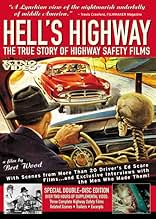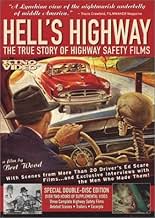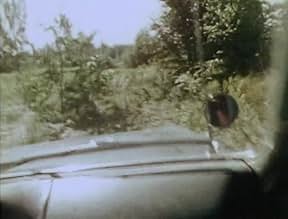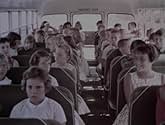IMDb RATING
6.9/10
233
YOUR RATING
The history of traffic safety educational films and their notoriously lurid content.The history of traffic safety educational films and their notoriously lurid content.The history of traffic safety educational films and their notoriously lurid content.
Richard Anderson
- Self - Husband
- (archive footage)
Sonny Bono
- Self
- (archive footage)
Hans Conried
- Self
- (archive footage)
Earle Deems
- Self
- (as Earle J. Deems)
Ronald Reagan
- Self
- (archive footage)
Robert F. Simon
- Self - Rellik
- (archive footage)
James Stewart
- Self - Narrator
- (archive footage)
Dick York
- Self - Nick
- (archive footage)
- Director
- Writer
- All cast & crew
- Production, box office & more at IMDbPro
6.9233
1
2
3
4
5
6
7
8
9
10
Featured reviews
The Underbelly of those kitchy educational 1950s films
HH charts the course of the company "Highway Safety Films" and their quest to make America's roads safer at the same time as they turn a profit. This documentary highlights gore of the original movies as well as the fact that this gore did little more than emotionally scar millions of impressionable youth.
HH also explores some of the underbelly of the company including allegations that the company made pornos on the Highway Safety Film Tour Bus. Unfortunately, these tangents are more interesting than the original subject matter and these tangents are left undeveloped.
HH also explores some of the underbelly of the company including allegations that the company made pornos on the Highway Safety Film Tour Bus. Unfortunately, these tangents are more interesting than the original subject matter and these tangents are left undeveloped.
Wake Up Calls are Long Distance
There's nothing cliché, or square, when it comes to waking people up. If you tell a teenager "DON'T Do IT", they probably will for the thrill of it. More people have died each year of car accidents than pandemics. So the idea of speaking to young or old driver's is preachy, and a waste of time is naïve. The automobile has been around since the early 1900's and the 1950's blossomed stupid "rebel without a cause" spoiled teenager movies, like Brando, the wild one. Something was desperately needed to SCARE the Hell out of people in general from driving like jackasses. These films like Signal 30, or blood on the highway was what was needed at the time. People today are just as stupid driving while texting. Its no better today, just more air-bags to combat the air-heads behind the wheel.
Overlong look at the legendary Driver's Ed crash films
This is a 90 minute documentary about the Highway Safety Institutes Driver's Ed shock films. Its a graphic trip down memory lane to a time and place that many of us never experienced and only heard about.
Hell's Highway is the story of the company that produced educational films for schools and institutions from the late 1950's until the 1980's. The Highway Safety Institute was borne of the idea that if people saw the horrors of traffic accidents they would drive more carefully. The film makers went out and filmed the aftermath of terrible accidents where the broke bodies were removed from the wreck cars for years. The film they shot ended up in dozens of films that grossed out generations of school kids.
This documentary is an interesting look at the people who went out and filmed the carnage. We get interviews with the film makers, police, and people who saw the films in addition to clips from the films themselves. Its a visceral experience that leaves you feeling a bit uneasy. Several clips are more shocking in the documentary than they probably are in the source films because you get the stories behind the footage which makes them more heartbreaking and gruesome.
The film however suffers from over length. Running some 90 minutes the film begins to feel pointless about half way in, as the film makers seem intent of telling you everything about the company that made these films (including rumors of porn films). Its not bad, its simply that after a while the interest begins to wane as the film goes into all of the other films that the company made. While not fatal I did find that I was stopping the film to do other things simply because I was losing interest.
If you are interested in seeing a rapidly disappearing slice of Americana I recommend you take the time and see this film. Its an informative (if gory) look into the past. Also if you saw any of these films as a teenager this is the perfect way of re-seeing the movies that probably haunted your nightmares for weeks afterward.
(And if you're really interested get your hands on the DVD which comes with a second disc with four or five complete films and clips from probably two dozen more)
Hell's Highway is the story of the company that produced educational films for schools and institutions from the late 1950's until the 1980's. The Highway Safety Institute was borne of the idea that if people saw the horrors of traffic accidents they would drive more carefully. The film makers went out and filmed the aftermath of terrible accidents where the broke bodies were removed from the wreck cars for years. The film they shot ended up in dozens of films that grossed out generations of school kids.
This documentary is an interesting look at the people who went out and filmed the carnage. We get interviews with the film makers, police, and people who saw the films in addition to clips from the films themselves. Its a visceral experience that leaves you feeling a bit uneasy. Several clips are more shocking in the documentary than they probably are in the source films because you get the stories behind the footage which makes them more heartbreaking and gruesome.
The film however suffers from over length. Running some 90 minutes the film begins to feel pointless about half way in, as the film makers seem intent of telling you everything about the company that made these films (including rumors of porn films). Its not bad, its simply that after a while the interest begins to wane as the film goes into all of the other films that the company made. While not fatal I did find that I was stopping the film to do other things simply because I was losing interest.
If you are interested in seeing a rapidly disappearing slice of Americana I recommend you take the time and see this film. Its an informative (if gory) look into the past. Also if you saw any of these films as a teenager this is the perfect way of re-seeing the movies that probably haunted your nightmares for weeks afterward.
(And if you're really interested get your hands on the DVD which comes with a second disc with four or five complete films and clips from probably two dozen more)
Highly recommended, but not for everyone
For just about anyone who took a driver's ed course in the sixties and seventies, those grisly highway safety films were usually the first exposure to the horrible truth about human mortality. For me, it was a little opus called "Death on the Highway". In my high school, you heard accounts of just what was in that film long before you finally got to see it. I saw it when I was seventeen, before I ever saw "Faces of Death 1", rotten.com, the footage of Budd Dwyer blowing his brains out, or the actual suicide of an unemployed dishwasher who jumped from the roof of a twelve-story building on a summer afternoon in 1986. "Hell's Highway" contains excerpts from "Death on The Highway", including the unforgettable image of two dead toddlers lying side by side, one with an arm severed. I've carried that image with me for thirty years, and when I saw it again in "Hell's Highway", I discovered that it hadn't altered a jot in my memory.
What makes "Hell's Highway: The True Story of Highway Safety Films" so very satisfying as a documentary is that it strives to cover its fascinating and obscure topic from every possible perspective. Therefore we have interview footage of John Butler, retired Chief of Police of Mansfield, Ohio, Earl Deems, who produced several of these 16mm traumafests, and Mike Vraney, head honcho at "Something Weird Video" who now markets these films to the morbidly curious. Everyone who speaks in this movie speaks intelligently, and is portrayed respectfully. No one is satirized or treated condescendingly. Part social history, part memoir, part critique, "Hell's Highway" focuses mainly on a company called Highway Safety Films, the film-making arm of the Highway safety Commision, which operated out of Mansfield from 1959 to 1979, and produced "Signal 30", "Mechanized Death", "Wheels of Tragedy", and "Highway Of Agony", among others.
Many of the interview subjects discuss whether showing grisly footage of bloody corpses being pulled from car wrecks to teenage kids actually made them safer drivers. To my way of thinking, it can't be proved either way, and the rule of "you can lead a horse to water, but the rule of "you can lead a horse to water but you can't make him drink" applies here. In other words, it would be irresponsible for educators not to try to make every effort to impress upon young drivers the consequences of reckless driving. What they do with the knowledge is not under the educator's control or responsibility.
The version of this film that I found in my Public Library came with a bonus DVD containing uncut versions of three of the best-known productions of the Highway Safety commission's short subjects. Personally, I think that watching these things still have the power to make the viewer want to pay attention to every last stop sign.
What makes "Hell's Highway: The True Story of Highway Safety Films" so very satisfying as a documentary is that it strives to cover its fascinating and obscure topic from every possible perspective. Therefore we have interview footage of John Butler, retired Chief of Police of Mansfield, Ohio, Earl Deems, who produced several of these 16mm traumafests, and Mike Vraney, head honcho at "Something Weird Video" who now markets these films to the morbidly curious. Everyone who speaks in this movie speaks intelligently, and is portrayed respectfully. No one is satirized or treated condescendingly. Part social history, part memoir, part critique, "Hell's Highway" focuses mainly on a company called Highway Safety Films, the film-making arm of the Highway safety Commision, which operated out of Mansfield from 1959 to 1979, and produced "Signal 30", "Mechanized Death", "Wheels of Tragedy", and "Highway Of Agony", among others.
Many of the interview subjects discuss whether showing grisly footage of bloody corpses being pulled from car wrecks to teenage kids actually made them safer drivers. To my way of thinking, it can't be proved either way, and the rule of "you can lead a horse to water, but the rule of "you can lead a horse to water but you can't make him drink" applies here. In other words, it would be irresponsible for educators not to try to make every effort to impress upon young drivers the consequences of reckless driving. What they do with the knowledge is not under the educator's control or responsibility.
The version of this film that I found in my Public Library came with a bonus DVD containing uncut versions of three of the best-known productions of the Highway Safety commission's short subjects. Personally, I think that watching these things still have the power to make the viewer want to pay attention to every last stop sign.
Fair
Hell's Highway: True Story of Highway Safety Films (2003)
** (out of 4)
Pretty disappointing documentary taking a look at the Highway Safety Films of the 60s and 70s. I was really looking forward to this thing but nothing really worked out too well. The interviews were rather boring, which is what really killed this. The film picks up in the final fifteen-minutes when we hear debates on whether these films did any good or not. I personally found the actual videos to be nothing more than offensive, tasteless scare tactics. Footage included one film where cops flips over a car to discover a dead baby that has been smashed to death. There are countless other bloody clips where people's heads are stuck through windshields and so on.
** (out of 4)
Pretty disappointing documentary taking a look at the Highway Safety Films of the 60s and 70s. I was really looking forward to this thing but nothing really worked out too well. The interviews were rather boring, which is what really killed this. The film picks up in the final fifteen-minutes when we hear debates on whether these films did any good or not. I personally found the actual videos to be nothing more than offensive, tasteless scare tactics. Footage included one film where cops flips over a car to discover a dead baby that has been smashed to death. There are countless other bloody clips where people's heads are stuck through windshields and so on.
Did you know
- ConnectionsFeatures The Story of Life (1948)
- SoundtracksPolarity
Performed by Alan Licht
Details
Box office
- Gross US & Canada
- $2,171
- Opening weekend US & Canada
- $1,225
- Jun 29, 2003
- Gross worldwide
- $2,171
- Runtime
- 1h 31m(91 min)
- Color
- Sound mix
- Aspect ratio
- 1.37 : 1
Contribute to this page
Suggest an edit or add missing content






















